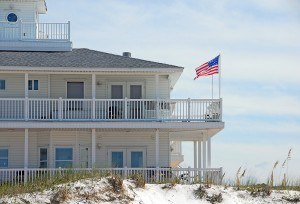

When Colin and Joyce Elston bought their Florida dream home in May, they were confident they could afford the three-bedroom, two-bathroom ranch with a pool and a backyard overlooking the Intracoastal Waterway.
Now they are not so sure.
The retirees said they had enough in savings and investments to pay the mortgage and the $1,482 yearly flood insurance on the home, which sits on palm tree-lined Paradise Boulevard on Treasure Island, a barrier island in the Gulf of Mexico.
But within two months of moving in, they received a stunning surprise: Due to a recently passed federal law, their flood insurance was slated to jump from less than $1,500 to $12,000 a year.
The rate hikes, which go into effect on Oct. 1, are due to the Biggert-Waters Flood Insurance Reform Act of 2012. The measure was passed to keep the National Flood Insurance Program solvent after an onslaught of claims from Hurricane Katrina in 2005. Essentially, what it does is remove federal subsidies from properties in flood zones.
“Everyone’s going to pay more for flood insurance,” said Lee Gorodetsky, an insurance agent in Fort Lauderdale. “It’s just a question of how much. And we’ve seen so many floods now: Colorado, last year, hurricane Sandy, before that, other parts of the country. And it’s obvious the … program is bankrupt.”
The Elstons – and others who bought property in flood zones after the act was signed into law on July 6, 2012 – will see their premiums increase nearly tenfold. Residents and businesses that already owned property in flood zones will see incremental increases of 25 percent annually.
“It’s a real mess,” said Treasure Island real estate agent Jim White, who noted that home sales are down because no one can afford to pay the full flood insurance rates. The real estate market in Florida was just beginning to recover following the recession, he said.
“Just the specter of this has killed the real estate market,” Treasure Island Mayor Robert Minning added.
At least one Florida legislator, and lawmakers in Louisiana, another state hard-hit by the changes, are hoping to persuade Congress to delay the rate hikes for a year.
But for families like the Elstons, that would just be postponing the inevitable: losing a house they will no longer be able to afford when the rates do kick in.
“We have to possibly look at losing this house,” said Colin Elston, who is 71 and bought the home for $575,000. “We’re not rich, we’re comfortable. We had a very good plan for retirement. We’ve been very financially responsible.”
Elston doubts he would get many buyers for his house after they are told about the flood insurance cost. The only way potential new owners could escape the expense is if they paid for the home in cash and decided to risk going without insurance.
Pinellas County, where Treasure Island is located, is No. 1 on the list in the United States of National Flood Insurance Program policyholders who are currently receiving subsidies – 13 percent, according to Pam Dubov, the county’s property appraiser.
“The ripple effect that we’re going to be feeling in Florida and other coastal states, I don’t think anybody thought ahead about that,” Dubov said.
She said some of the affected homes aren’t even on or near a body of water, but in low-lying inland areas that are considered flood zones.
Federal Emergency Management Agency Director Craig Fugate acknowledged the “sticker shock” residents are feeling.
But he said that eliminating subsidies means the federal government won’t have to continue to borrow money to pay for the insurance.
“The true cost” of insurance “has been provided at below-market rate,” Fugate said during a visit to Florida’s Emergency Operations Center last month.
Fugate noted that the rate hikes will be phased in over time for those with primary residencies, but that larger hikes will take effect for those insuring secondary homes or homes that have recently sold.
FEMA says the phase-out of subsidies will affect fewer than 20 percent of flood policyholders nationwide.
Nonetheless, Florida state Rep. Dwight Dudley is calling for a special session on the situation and is hoping Congress will delay implementing the rate hikes for at least a year.
“Bankrupting individuals and communities is unnecessary and counterproductive to our economic recovery and will have long term dramatic impacts on the construction, insurance, banking, and real estate markets as well as the property tax revenues of state and local governments,” Dudley wrote in a news release last week.
Dubov, the Pinellas County property appraiser, questioned the wisdom of removing the subsidies.
“There are subsidies for a lot of things in our country. This subsidy has been targeted and it affects a bunch of average homeowners. It’s not a bunch of rich people,” she said.
The Elstons said that when they bought the home as their primary residence, their mortgage broker and insurance agent didn’t tell them of the impending flood insurance changes. Because of that, they’ve retained a lawyer.
“To us, it borders on the criminal,” said Colin Elston, adding that an insurance commissioner told him that there is no legal requirement for an insurance agent to notify a person buying a home of any upcoming changes.
The Elstons had planned on holding their 50th wedding anniversary party in 2014, and had anticipated a happy gathering of family and friends on the patio, overlooking the pool and the dolphins they often sight in the Intracoastal Waterway.
Now, said Joyce Elston, “There doesn’t seem much point.”
(Associated Press Writer Gary Fineout in Tallahassee contributed to this report.)